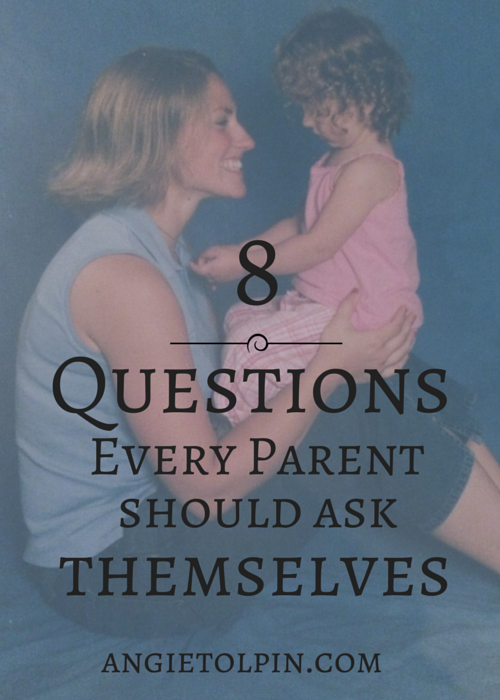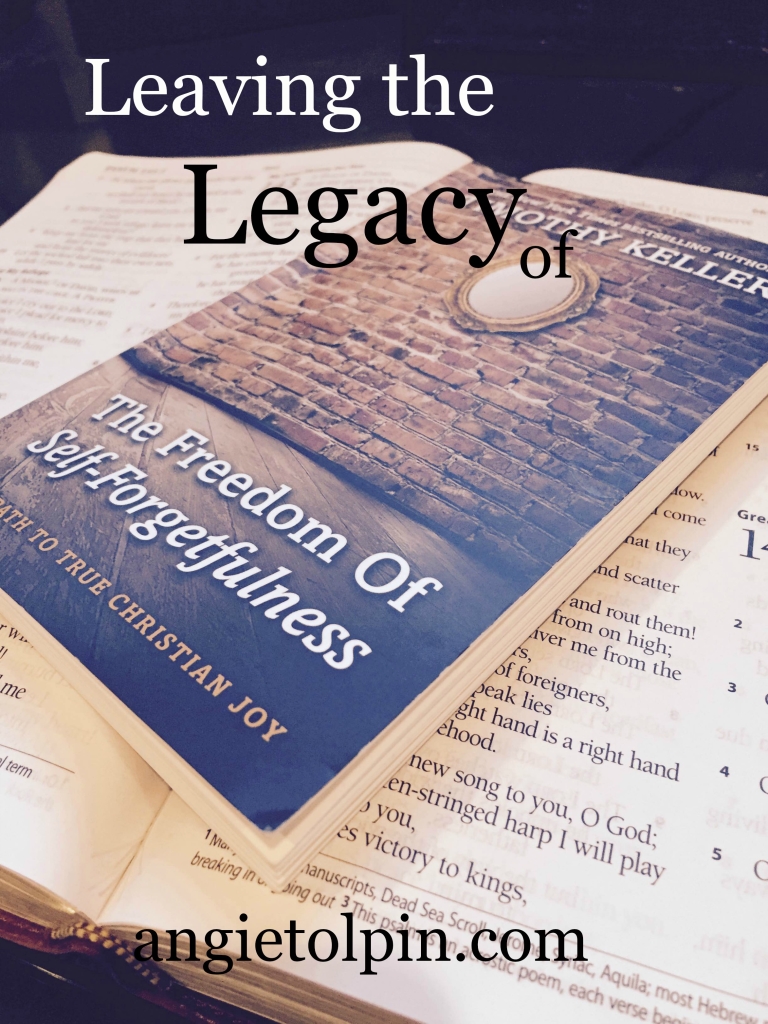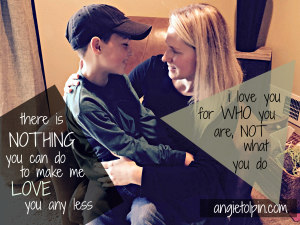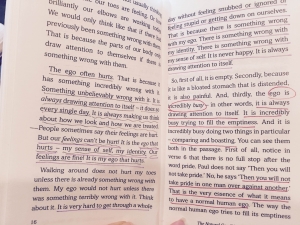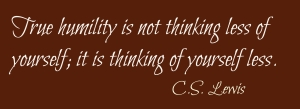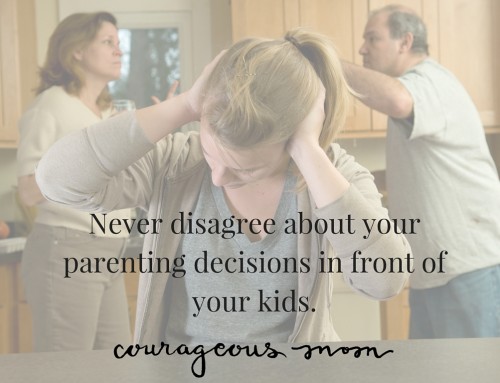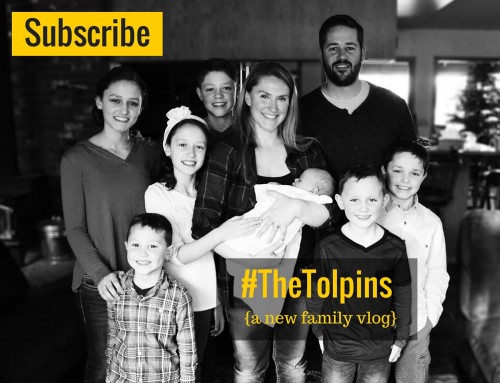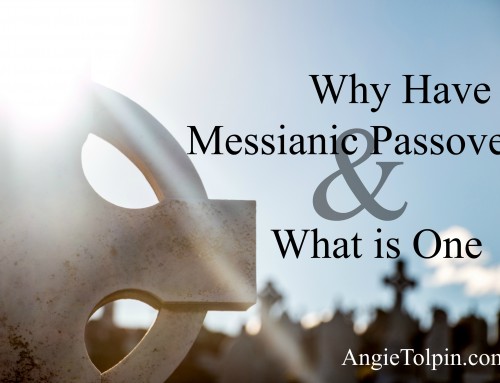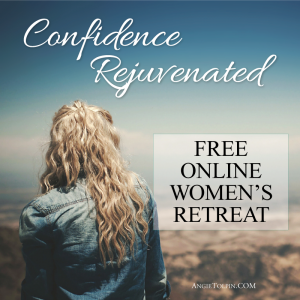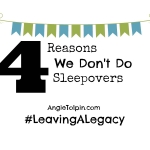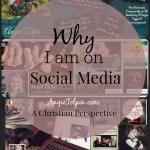{The 8 Questions are Near the Bottom of the Post}
If you are anything like me, you are aware of your own selfish sin, and see it played out in the little mini-me running around your home everyday?
And the more children you have, the more you see it right?
I recently read a fantastic book. One that is worth reading for your own personal edification and spiritual growth, but also from the perspective of how do we train our children up to be aware of their selfishness and their attempts at preserving their “ego” as well.
Here is a short video on really engaging the content you come in contact with via books, sermons, iPod casts, blogs, etc as a student for personal growth and then turning around and asking yourself the question, how could this impact my child?
Execution of what we learn is the hardest part, but if we are teaching it to our children, we ourselves are held to an even higher accountability to practice what we preach, and the simple act of teaching what we learn further impresses upon us the execution factor.
One of the most stimulating activities Isaac and I do together is visioneer together. We love it. Probably more than most. When we have scheduled a date night, we often choose to sit over a good meal, dream, discuss, evaluate and plan out our current mission. We evaluate where we are at as a couple, our family, where each of the kids are and what we would like to see more of happening in our family {serving, character qualities, whatever}. But I love when we get the time to talk about specific legacies and how we are going to be proactive about leaving them.
We all leave a legacy, whether we are intentional about it or not. Click 2Tweet
But one such legacy that we leave without fail is rooted deep within who we are as humans. It is the generational legacy of being sinners.
At the root of our heritage as sinners is the Heart Attitude or Spirit of Selfishness. Click 2Tweet
Just as generations before us have battled the sin of the flesh, which has many disguises, so will our children fight this inner battle as well. It’s not necessarily our personal legacy, though some sins may be influenced by our discipleship. However, we wage the war within us and so did our forefathers generations before us.
But how we wage the war on sin, that can be a legacy we leave. Click2Tweet
We can choose to be vulnerable enough to share about the battle with our children, to teach them the lessons we have learned along the way.
The Legacy of Self-Forgetfulnness is one such legacy that requires awareness and pursuit.
It is in our human nature, our tendencies for the self-preservation of our ego, in the location of our soul, that we wage war against what the world justifies, the sin to put oneself before others.
It may seem simple to you, “Do nothing from selfish ambition or conceit, but in humility count others more significant than yourselves.” Phil. 2:3
“Be devoted to one another in love. Honor one another above yourselves.” Romans 12:10
But how does one leave this kind of legacy?
Before we can ask this question of our children, we have to first ask it of ourselves. Are our intentions with others consistently from a giving heart? Or do we expect something back in return?
This past month I read a quick book, chalked full of challenge, entitled “The Freedom of Self-Fogetfulness,” written by Timothy Keller. I haven’t typically recommended books here, although I hope to more in the future. But this book is worth the read, if for nothing else, than to evaluate the condition of your ego. Keller’s book is an expository of 1 Corinthians 3:21-4:7 largely. In light of this teaching by Paul, Keller makes us aware that Paul is actually teaching the Corinthians about the human ego, that it is “empty, painful, busy, and fragile.” From the immediate glance, it would be easy to interrogate this statement, which is why I suggest you get the book.
I love this quote on page 15.
“In his book Sickness Unto Death, Soren Kierkegaard says, “it is the normal state of the human heart to try to build it’s identity around something besides God.” Spiritual pride is the illusion that we are competent to run our own lives, achieve our own sense of self-worth and find purpose big enough to give us meaning in life without God. He states that the normal human ego is built on something besides God.”
So good, isn’t it? Our first responsibility when reading a book or listening to a sermon is to reflect on how this impacts us. Is it convicting? Then as a follower of Christ, I think on, how does this impact my mission within the Great Commission? First priorities first, I think specifically of my children? If the normal human heart’s tendency is to build their ego upon things other than Christ, I need to warn my children to be aware! I need to teach and help them to build it upon how He views them. That He loves them unconditionally, not based upon performance. Do we do that?
Do we say out loud, many times over… “there is nothing you can do to make me love you less or love you more!”
Because this is what Jesus says to us, his children. It’s our privilege to say it to our children on His behalf.
The ego often hurts… such a great thing to teach the children!
How many times have you heard the whine, “he hurt my feelings!”
Well, imagine teaching your children that it isn’t their “feelings” that are hurt. It’s their ego. To teach the other child to build one another up and consider one another before themselves.
But to also teach and train your children to be able to receive reproof, correction, and exhortation aware that when they can’t take it and claim it hurt their feelings, it’s really that it hurts their ego. What does that reveal?
For us, what does it reveal when we can’t hear another’s concerns, or correction and instead we dodge reproof or warning when someone comes to us in love and shares what they “feel” is hurting the relationship? Now, I am speaking of myself here as well, because I have been convicted of this. As we all should admit. We are masters at turning off the reproof, all in the name of “hurt feelings.” Aren’t we? Instead of taking exhortation, rebuke, or reproof, out of self-preservation of our egos {an actual organ in our soul according to Keller and Paul} we try to turn it around and blame something or someone else, to protect our egos. It’s an emotional survival of the fittest. And I see it in my children often. Do you?
Now I know, my children are not the only ones who have moments of pride or self-protecting instincts. Moments where they don’t want to be corrected or their sins pointed out. But if we do not train them in being able to receive it when they are older, if we don’t train them to be regular repenters, who will? The Lord humbles the proud. “But he gives us more grace. That is why Scripture says: “God opposes the proud but shows favor to the humble.” James 4:6
We parents need to wake up and be proactive about teaching our children how to receive correction well, especially since the church doesn’t teach us how to.
Pretty bold statement isn’t it. But it is true. For years this has been something has bothered multitudes of people in the church. Where many, not all, but many churches do not rebuke, reproof or exhort from the pulpit, but instead preach only what is palatable. This is clearly a reflection of caring too much what the masses think and not enough of preaching the full truth. However, this is so much easier said than done.
My compassion goes out the many pastors who do feel compelled to reproof at times, but are fearful of losing a majority of a congregation if they do. They just want them to know Jesus. They see that the masses are not able to receive correction. Which is not ONLY the church leaders fault, but also a reflection of how WE THE CHURCH WERE RAISED.
It’s human nature to try and look for someone else to blame. To look around real quick and loin the finger. So that we don’t have to take full responsibility for our part in it. Isn’t it?
We all, including parents, look for someone to blame for our lack… even when it comes to how what we teach or don’t teach our children. It’s not always someone else’s fault. It’s not JUST the fault of the church institution. So let’s change that for the next generation! You with me?
We ourselves were not raised to receive correction and STILL love the corrector. {Now, I know I am speaking in terms of we and that I don’t represent the whole, so bear with me, but this is pretty typical of the majority of our upbringing}. The majority of generations who are the current church goers are not typically known for asking for correction or constructive criticism and looking for opportunities to grow and change? I know I don’t.
And this in 1 Peter 5:5
“In the same way, you who are younger, submit yourselves to your elders. All of you, clothe yourselves with humility toward one another, because, “God opposes the proud but shows favor to the humble.”
Do you think the generation before us did this? Or the generation before them? I don’t believe that generation X, Y, or Z is known for humbling themselves in submission to their elders. If we want to raise up the next generation, as godly men and women, who are worthy to lead this depraved generation who has been led in a legacy of pride and identity being found in their own power, we have to discuss this with our children regularly. I am so convicted brothers and sisters, of my own example to my children.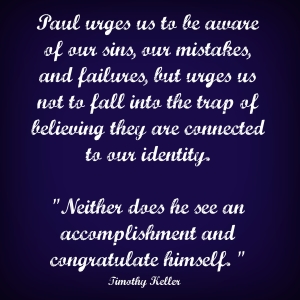
The other strong point related to the ego, that Keller engages in his book, is the concept of the development of ones identity. Looking at Paul’s preaching on this passage reveals that one who has their true identity in Christ, is not impacted by what others think of them, or might think of them, or even… what they think of themselves. The point is to think of oneself less
Here is one test Keller provides in his book… think on this with regard to yourself, but then also, ask yourself, what do you see exhibited in your children?
“The self-forgetful person would never be hurt particularly badly by criticism. It would not devastate them, it would not keep them up late, it would not bother them. Why? Because a person who is devastated by criticism is putting too much value on what other people think, on other people’s opinions.” pg. 33
Do they ignore criticism? Not in the slightest.
The self-forgetful person will “listen to it and see it as an opportunity to change” and grow.
The last key to finding the freedom in self-forgetfulness, as Keller teaches from Paul’s writing, is to “not care what we think of ourselves.”
“Like Paul, we can say, ‘I don’t care what you think. I don’t even care what I think. I only care about what the Lord thinks.’ And he has said, Therefore, there is now no condemnation for those who are in Christ Jesus’, and ‘You are my beloved child in whom I am well pleased’. Live out of that.” End quote
8 Questions to reflect on:
1. Have I modeled for my children being able to take criticism well, thoughtfully?
2. Or have I modeled being critical, in attempts to preserve my own ego?
3. Am I aware of my self preserving attempts to build up my own ego?
4. Am I aware of my own selfishness and readily repent of it, including to my spouse and children?
5. Am I proactive at holding my children accountable when they are being selfish, and do I help restore their heart, leading them to the Father when they are not receiving correction from anyone?
6. Is my identity secure in how my Creator, God views me alone or does my own view of myself get mislead by how others view, how I assume others view me, or how I view myself?
7. Am I proactively leading my children to find their identity in God and holding them accountable when they allow the whispers of the enemy to tempt them to build their foundation on temporary things, or be influenced by others {?6}?
8. Do my children hear, and know that there is NOTHING they can do to make me love them any less or any more? Tell them today.
It’s amazing how hurt egos lead a person to react. Instead we need to lead our ego. Just like we can exercise our heart, we need to exercise our ego in humility. But it takes actually thinking of ourselves less.
This study of the ego, as a part of our soul, is a deep one. One worth investing time in.
What are you learning from the Lord right now? How is that impacting your marriage and parenting? Feel free to connect in the comments or share a blog post there as well.

May the Lord lead you and your conversations with your children.
I would love to connect with you on social media or here in the comments! You can find me here on Facebook!
We have talked a lot about legacy here, you and I. When you think of legacy, what comes to mind?
Leaving a Legacy of a Strong Marriage {a collection of posts on marriage}
Leaving a Legacy of Purposeful Parenting {a collection of parenting posts}
The Legacy of Worship
A Legacy of Prayer
A Legacy of Biblical Friendship
The Legacy of Reliance
The Most Important Legacy: The Legacy of Faith
Leaving a Legacy of Health
Leaving a Legacy of Work Ethic
Modeling & Teaching Your Children to be Intentional in Choosing a Church

